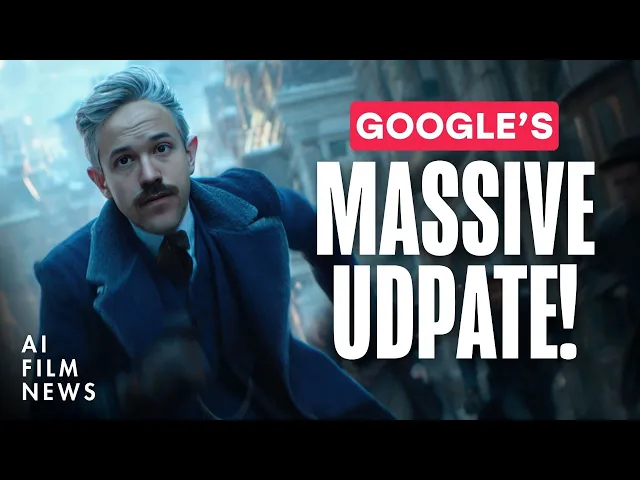AI Filmmaking Just Changed Forever

AI enters Hollywood's editing room
In the rapidly evolving landscape of film production, artificial intelligence is making unprecedented inroads into creative processes once deemed exclusively human. The video explores how AI tools are revolutionizing filmmaking, particularly in post-production, where they're transforming everything from dialogue replacement to color grading. This technological shift promises to democratize filmmaking while raising profound questions about the future relationship between human creativity and machine efficiency.
Key insights from the video
-
AI editing tools are streamlining post-production workflows, allowing filmmakers to accomplish in minutes what previously took hours or days, particularly with tasks like dialogue replacement and color grading.
-
The technology enables "directorial omnipotence" by giving creators the ability to modify footage after shooting has wrapped, potentially reducing the need for expensive reshoots and expanding creative possibilities.
-
While these AI innovations make filmmaking more accessible to creators with limited resources, they simultaneously raise concerns about job displacement and the authenticity of performances.
-
Many of these technologies are built on foundation models trained on copyrighted works, creating legal and ethical questions about intellectual property and fair compensation.
-
The industry appears to be approaching an inflection point where AI tools aren't just assisting human creativity but potentially replacing significant aspects of traditional production processes.
The paradigm shift in post-production
The most profound insight from this video is how AI is fundamentally altering the relationship between production and post-production in filmmaking. Traditionally, most creative decisions had to be locked during shooting, with post-production serving primarily as assembly and refinement. Now, AI is transforming post-production into a second stage of creative decision-making, where directors can substantively alter performances, dialogue, and visual elements long after cameras stop rolling.
This matters because it represents a dramatic power shift in how films are made. Historically, filmmaking has been a collaborative art form with natural checks and balances distributed across different specialists. When directors gain unprecedented control to reshape performances algorithmically rather than through actual collaboration with actors, it fundamentally changes the nature of film as an art form. It also potentially concentrates more creative control in fewer hands, even as it paradoxically makes filmmaking more accessible to newcomers.
The overlooked implications
What the video doesn't fully explore is how these technologies might affect audience trust and film criticism. As viewers become aware that what they
Recent Videos
How To Earn MONEY With Images (No Bullsh*t)
Smart earnings from your image collection In today's digital economy, passive income streams have become increasingly accessible to creators with various skill sets. A recent YouTube video cuts through the hype to explore legitimate ways photographers, designers, and even casual smartphone users can monetize their image collections. The strategies outlined don't rely on unrealistic promises or complicated schemes—instead, they focus on established marketplaces with proven revenue potential for image creators. Key Points Stock photography platforms like Shutterstock, Adobe Stock, and Getty Images remain viable income sources when you understand their specific requirements and optimize your submissions accordingly. Specialized marketplaces focusing...
Oct 3, 2025New SHAPE SHIFTING AI Robot Is Freaking People Out
Liquid robots will change everything In the quiet labs of Carnegie Mellon University, scientists have created something that feels plucked from science fiction—a magnetic slime robot that can transform between liquid and solid states, slipping through tight spaces before reassembling on the other side. This technology, showcased in a recent YouTube video, represents a significant leap beyond traditional robotics into a realm where machines mimic not just animal movements, but their fundamental physical properties. While the internet might be buzzing with dystopian concerns about "shape-shifting terminators," the reality offers far more promising applications that could revolutionize medicine, rescue operations, and...
Oct 3, 2025How To Do Homeless AI Tiktok Trend (Tiktok Homeless AI Tutorial)
AI homeless trend raises ethical concerns In an era where social media trends evolve faster than we can comprehend them, TikTok's "homeless AI" trend has sparked both creative engagement and serious ethical questions. The trend, which involves using AI to transform ordinary photos into images depicting homelessness, has rapidly gained traction across the platform, with creators eagerly jumping on board to showcase their digital transformations. While the technical process is relatively straightforward, the implications of digitally "becoming homeless" for entertainment deserve careful consideration. The video tutorial provides a step-by-step guide on creating these AI-generated images, explaining how users can transform...
